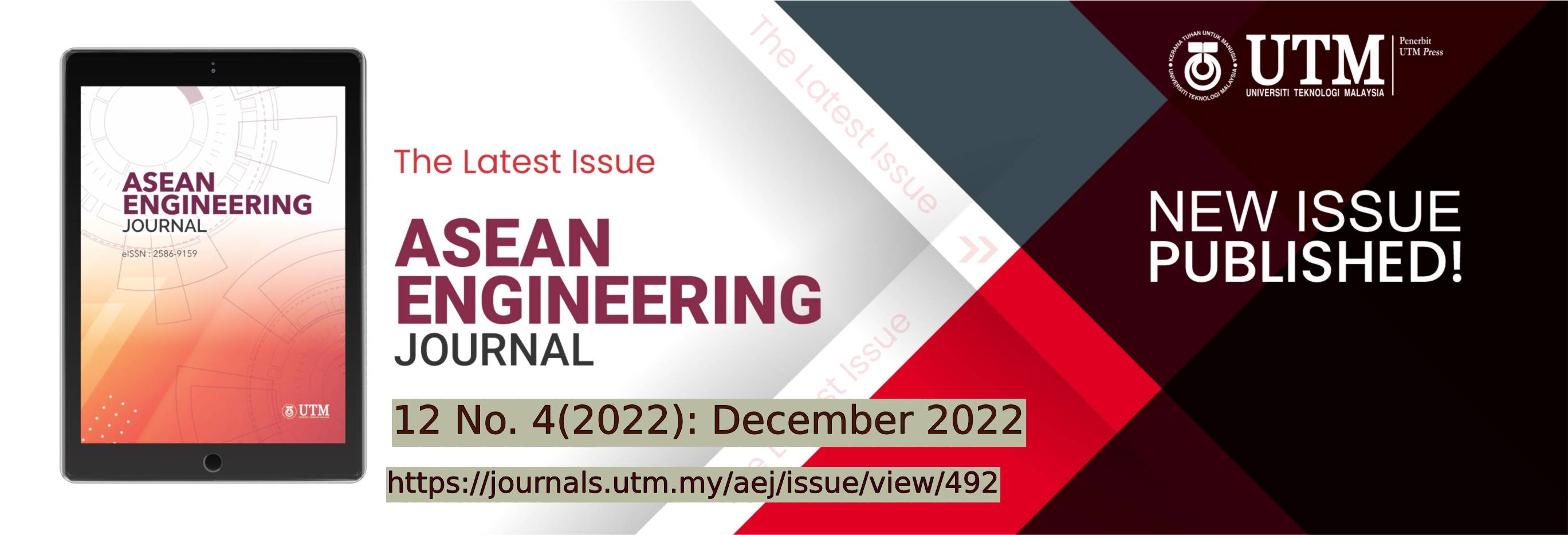DEVELOPMENT OF A REHABILITATION ROBOT: MODELING AND TRAJECTORY TRACKING CONTROL
DOI:
https://doi.org/10.11113/aej.v12.17196Keywords:
Active disturbance rejection control, Pneumatic artificial muscle, Rehabilitation robot, Gait training systemAbstract
Recently, assistive robots have attracted great attention from researchers in the rehabilitation field. These types of robots support patients to perform designated movements during a training process. Despite the existence of commercial rehabilitation systems, growing demands for improvement in both hardware and control design are evident. Therefore, this paper introduces a prototype pneumatic artificial muscle-based assistive robot named BK-Gait and its control strategy for trajectory tracking purposes. Firstly, a brief description of the robot mechanism is presented. Secondly, the mathematical model of the robot’s actuator is built. Third, an active disturbance rejection control (ADRC) strategy is developed to enhance the tracking performance of the robot. Finally, multi scenarios experiments are carried out to evaluate the applicability of the robot and the proposed controller in the rehabilitation field.
References
D.W. Repperger, D.B. Reynolds, C.A. Phillips and G. Bandry. 2003. Modeling the dynamic characteristics of pneumatic muscle, Annals of Biomedical Engineering, 31: 310–317. DOI : https://doi.org/10.1114/1.1554921
Ling Zhao, Haiyan Cheng, Yuanqing Xia and Bo Liu. 2018. Angle Tracking Adaptive Backstepping Control for a Mechanism of Pneumatic Muscle Actuators via an AESO, IEEE Transactions on Control Systems Technology, 66(6): 4566-4576. DOI : http://doi.org/10.1109/TIE.2018.2860527
Xie, D.; Ma, Z.; Liu, J.; Zuo, S. 2021, Pneumatic Artificial Muscle Based on Novel Winding Method. Actuators 10 : 100. DOI : https://doi.org/10.3390/act10050100
Hee Doo Yang, Brandyn T. Greczek and Alan T. Asbeck, 2019.Modeling and Analysis of a High-Displacement Pneumatic Artificial Muscle With Integrated Sensing, Original Research Article, 5(136): 1-13?DOI: http://doi.org/ 10.3389/frobt.2018.00136
Mižáková J, Piteľ J, Tóthová M. 2013;Pneumatic Artificial Muscle as Actuator in Mechatronic System. AMM 460: 81–90. DOI : http://doi.org/ 10.4028/www.scientific.net/AMM.460.81
Andrikopoulos, G.; Nikolakopoulos, G.; Manesis, S. 2014Advanced Nonlinear PID-Based Antagonistic Control for Pneumatic Muscle Actuators. IEEE Trans. Ind. Electron., 61: 6926–6937 DOI: http://doi.org/ 10.1109/TIE.2014.2316255
Nguyen Ngoc Son, Cao Van Kien, Ho Pham Huy Anh. 2017. A novel adaptive feed-forward-PID controller of a SCARA parallel robot using pneumatic artificial muscle actuator based on neural network and modified differential evolution algorithm. Robotics and Autonomous Systems, 96: 65-80, ISSN 0921-8890. DOI: http://doi.org/ 10.1016/j.robot.2017.06.012
Ting Wang, Xiuxiang Chen and Wen Qin. 2019. A novel adaptive control for reaching movements of an anthropomorphic armdriven by pneumatic artificial muscles. Applied Soft Computing, 83: 105623.
DOI : http://doi.org/10.1016/j.asoc.2019.105623
J. H. Lilly and Liang Yang. 2005. Sliding mode tracking for pneumatic muscle actuators in opposing pair configuration. in IEEE Transactions on Control Systems Technology, 13(4): 550-558. DOI : http://doi.org/ 10.1109/TCST.2005.847333
A. Enzevaee, A. Enzevaee, M. Mailah M. Mailah, and S. Kazi S. Kazi. 2018. Control Of A Single Link Robot Arm Actuated By Pneumatic Artificial Muscles Employing Active Force Control And Fuzzy Logic Via Hardware-In-The-Loop-Simulation. Jurnal Mekanikal 36 (2): 66-85
Dao, Q.-T.; Nguyen, M.-L.; Yamamoto, S.-i. 2019. Discrete-Time Fractional Order Integral Sliding Mode Control of an Antagonistic Actuator Driven by Pneumatic Artificial Muscles. Applied Sciences, 9: 2503. DOI : http://doi.org/ 10.3390/app912250
L. Zhao, Q. Li, B. Liu and H. Cheng, 2019"Trajectory Tracking Control of a One Degree of Freedom Manipulator Based on a Switched Sliding Mode Controller With a Novel Extended State Observer Framework," in IEEE Transactions on Systems, Man, and Cybernetics: Systems, 49(6): 1110-1118. DOI : http://doi.org/ 10.1109/TSMC.2017.2719057
T. Choi, B. Choi and K. Seo, 2011. "Position and Compliance Control of a Pneumatic Muscle Actuated Manipulator for Enhanced Safety," in IEEE Transactions on Control Systems Technology, 19(4): 832-842. DOI : http://doi.org/10.1109/TCST.2010.2052362
Dao Q-T, Yamamoto S-i. 2018. Assist-as-Needed Control of a Robotic Orthosis Actuated by Pneumatic Artificial Muscle for Gait Rehabilitation. Applied Sciences. 8(4):499. DOI : http://doi.org/10.3390/app8040499
Ling Zhao, Xin Liu and TaoWang, 2019. “Trajectory tracking control for double-joint manipulator systems driven by pneumatic artificial muscles based on a nonlinear extended state observer”, Mechanical Systems and Signal Processing, 122: 307-32. DOI : http://doi.org/10.1016/j.ymssp.2018.12.016
Dao, QT., Le Tri, TK., Nguyen, VA. et al. 2022. Discrete-time sliding mode control with power rate exponential reaching law of a pneumatic artificial muscle system. Control Theory Technol. DOI : https://doi.org/10.1007/s11768-022-00117-8.
Y. Yuan, Y. Yu, Z. Wang and L. Guo, 2019. "A Sampled-Data Approach to Nonlinear ESO-Based Active Disturbance Rejection Control for Pneumatic Muscle Actuator Systems with Actuator Saturations", IEEE Transactions on Industrial Electronics, 66(6): 4608-4617. DOI : http://doi.org/ 10.1109/TIE.2018.2864711
Y. Yuan, Y. Yu, Z. Wang and L. Guo, 2019 "A Sampled-Data Approach to Nonlinear ESO-Based Active Disturbance Rejection Control for Pneumatic Muscle Actuator Systems with Actuator Saturations," in IEEE Transactions on Industrial Electronics, 66(6): 4608-4617. DOI : http://doi.org/10.1109/TIE.2018.2864711
Aole S, Elamvazuthi I, Waghmare L, Patre B, Meriaudeau F. 2020. Improved Active Disturbance Rejection Control for Trajectory Tracking Control of Lower Limb Robotic Rehabilitation Exoskeleton. Sensors.; 20(13):3681. DOI : http://doi.org/10.3390/s20133681
J. Han, 2009."From PID to Active Disturbance Rejection Control," in IEEE Transactions on Industrial Electronics, 56(3): 900-906. DOI : http://doi.org/ 10.1109/TIE.2008.2011621
Herbst, Gernot. 2013. "A Simulative Study on Active Disturbance Rejection Control (ADRC) as a Control Tool for Practitioners" Electronics 2(3): 246-279. DOI : http://doi.org/ 10.3390/electronics2030246
David A. Winter, 1990. “Biomechanics and Motor Control of Human Movement”, Fourth Edition DOI: http://doi.org/ 10.1002/9780470549148
















